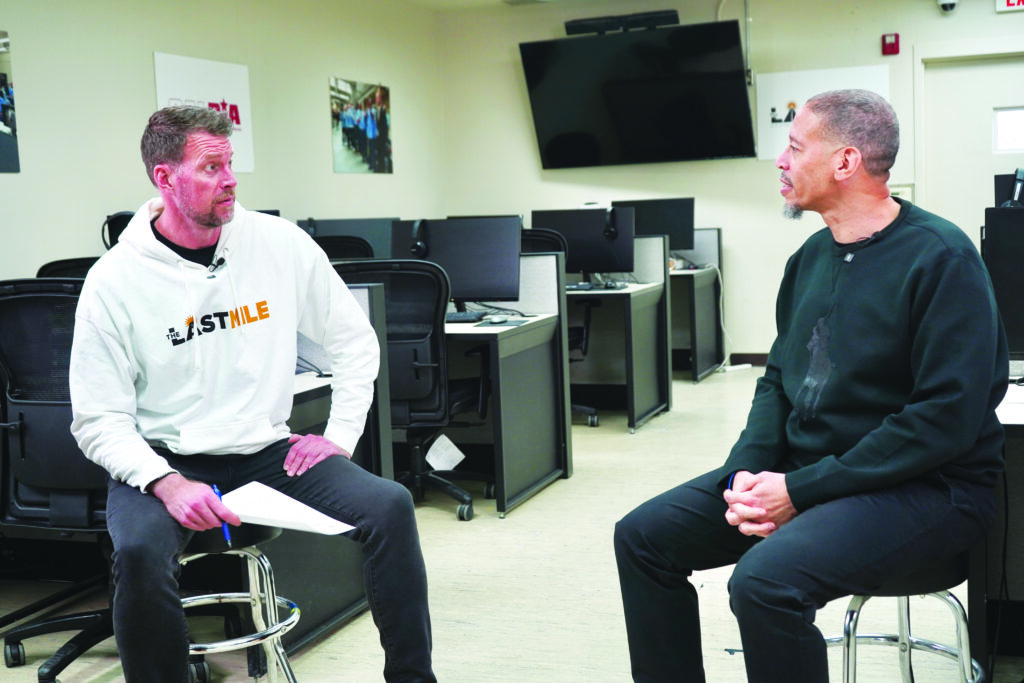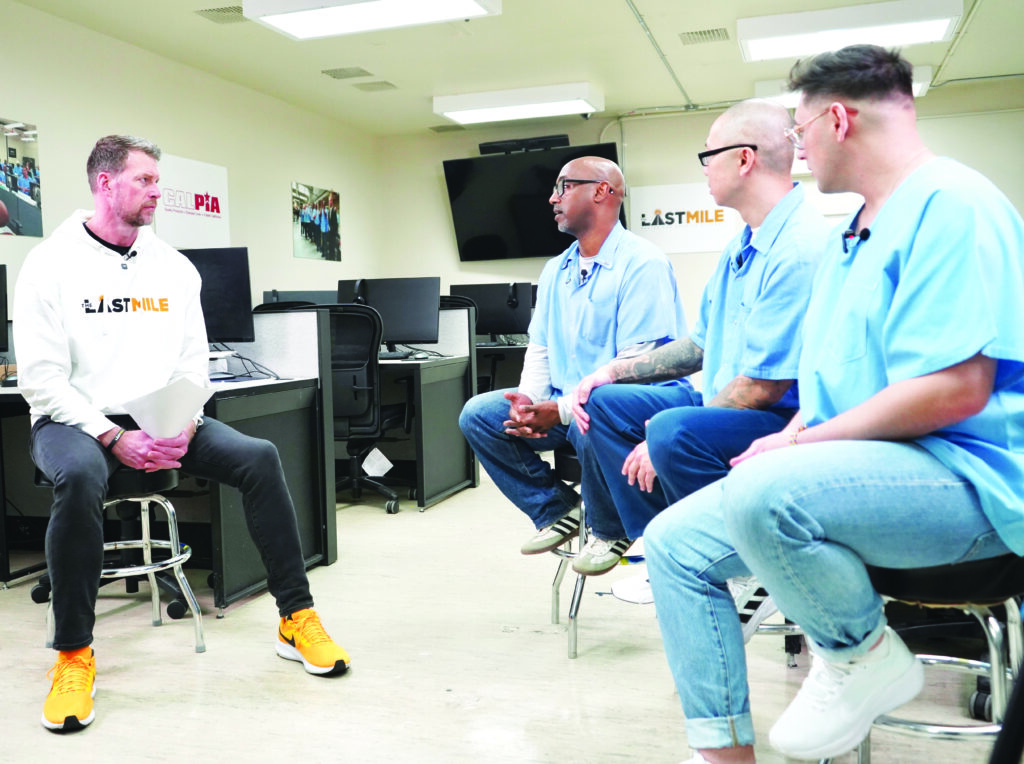
Athletes sometimes hit rock bottom, just like the rest of us. Sometimes they might redefine themselves, turning out stronger than before.
Ex-San Diego Charger quarterback and formerly incarcerated resident Ryan Leaf hosted The Last Mile’s podcast at San Quentin Rehabilitation Center in January. Leaf attained the fame and fortune of which athletes around the world might only dream, then he fell and endured scars that have made him one of the nation’s leading motivational speakers. Leaf spent 32 months for possession of narcotics, burglary, and other charges in the Montana State Prison system.
“The sally port was hard, coming back in and hearing the clanging of steel always traumatizes me,” said Leaf at his first visit to SQRC.
The podcast, called Over The Walls, also has recorded shows in the Montana State Prison system. At SQRC, Leaf said that while he was incarcerated he experienced an epiphany; realizing he needed to change his life.
Since then, his recovery has allowed him to announce NFL play-by-play for Westwood One Radio. He also has advised NFL rookies on the pitfalls of fame and fortune.
Leaf recorded the podcast with three students from The Last Mile, SQRC’s coding program before he spoke about his story of redemption and exhibited his views of social reform in front of a packed Chapel B.
“We’re changing the stigma of justice impacted people. To the outside, these men are just criminals, just numbers, but SQRC has done so much, and I’m introducing you to some of SQRC’s change agents,” said Leaf.
Leaf admitted, “I had no idea what I was going to do upon my release. Everyone thought it was over …once I was stamped with that [prison] number.”
Leaf introduced the TLM students, Henok Rufael, 46, Tam Nguyen, 44, and Anthony Tafoya, 35.
The trio spoke about their development through TLM as Leaf asked them about the moments that defined their advancement in their rehabilitation.
Nguyen said he started his criminal career as a 14-year-old before living through two prison terms.
“I was immature, not seeing the opportunities,” said Nguyen. “I was a product of foster care, lived in households suffering from domestic violence, and I chose homelessness after my crimes. While in the hole at Kern Valley State Prison, I thought I’d die in prison. Finally, I realized everything was my fault”
He continued, “The only tech in prison was the pay phones on the walls. I came to TLM and told myself I could do this, and the teaching assistants and students helped.”
Tafoya said he discovered how his crime affected his community. “My sister didn’t talk to me. I didn’t know if I could fix that, but TLM allows me to move forward.”
Leaf spoke about denial, rejections, and the shame he felt from his addiction and fall-out.
“About his fan mail, Leaf said, “I’d tear it up and throw it all in the trash; even the letters from Peyton and Eli Manning and my former coach Kevin Gilbride,” said Leaf. “There were people reaching out to me but I always refused. I was self-absorbed and didn’t care about anyone or anything but myself.”
“There were times when I couldn’t look at myself in the mirror,” said Leaf.
He said his “subtle changes” included, “Finding my self-awareness, a mind change that was necessary to go home.”
He asked the panelists about the causes of changes in their lives.

Rufael said witnessing his grandmother crying [at county jail] helped him change.
Some of Leaf’s transformation happened in solitary confinement. “Having a resentment is like drinking poison, the worst place I could be is by myself. I was in the hole 83 days, because they claimed it was for my safety,” said Leaf.
He spoke of the benefits of his rehabilitation.
“When you make it about someone else, your life gets better. TLM feeds into the idea that you can be your own boss. I was the boss of me and that was huge, my own content. That was unbelievable.
“The strengths inside versus outside? Outside you never hear ‘I’m [expletive] hurting. Can you help me? And my guys got me,” said Leaf. “[Outside] you’re going to get kicked in the face, so remember to ask for help.”
Leaf then relocated to Chapel B to speak to the sports community.
“I’m not a millionaire, high draft pick, star athlete,” exclaimed Leaf, “I’m the junkie who made it.”
As a star at Washington State University, the then-21-year-old Leaf received the highest-paid contract for a draftee, a $31 million deal from the San Diego Chargers. Endorsement deals with Nike, Cadillac and Rolex followed before he suffered an injury that he said made him addicted to pain pills.
“I took pills from family members, and friends. As I became more desperate I went into the homes of strangers in my hometown to steal pills,” said Leaf.
On March 30, 2012 Leaf was arrested. He faced a 55-year sentence.
During his arrest, he ingested pills he stashed before being cuffed and spent his 83 days in solitary confinement, before being sentenced.
Leaf said he could not understand why he received only seven years. He then asked the judge for the maximum of 55 years.
He said the Montana State Prison system offered no rehabilitative programs. “I laid on my bunk watching the “Red Zone” channel and getting addicted to Dr. Pepper,” said Leaf.
Leaf spoke of his cellmate, a former Vietnam veteran who killed someone in a drunk-driving accident. Together, they volunteered in the prison library, and Leaf agreed to help teach reading to a Native American.
His cellmate called Leaf valuable to the incarcerated community, which inspired Leaf, who dedicated himself to recovery, and became a teacher’s assistant for substance abuse counselors.
Leaf refused parole on two occasions. Only as his cellmate threatened to refuse his parole, too, Leaf agreed to his release.
On December 3, 2014, Leaf left Montana State Prison.
“It changed my perspective completely, it’s not about me anymore,” Leaf told the crowd. “Giving back will help others no matter what has happened in your past.”
“I’m on a mission from God now,” said Leaf.
Leaf said he would celebrate his 14th year of sobriety on April 1, added that he would work to continue to advocate recovery to others.
“I’m a flawed human being just like you,” said Leaf, “I feel more comfortable inside these walls.”
—Martin Keith DeWitt, Journalism Guild Writer, contributed to this story